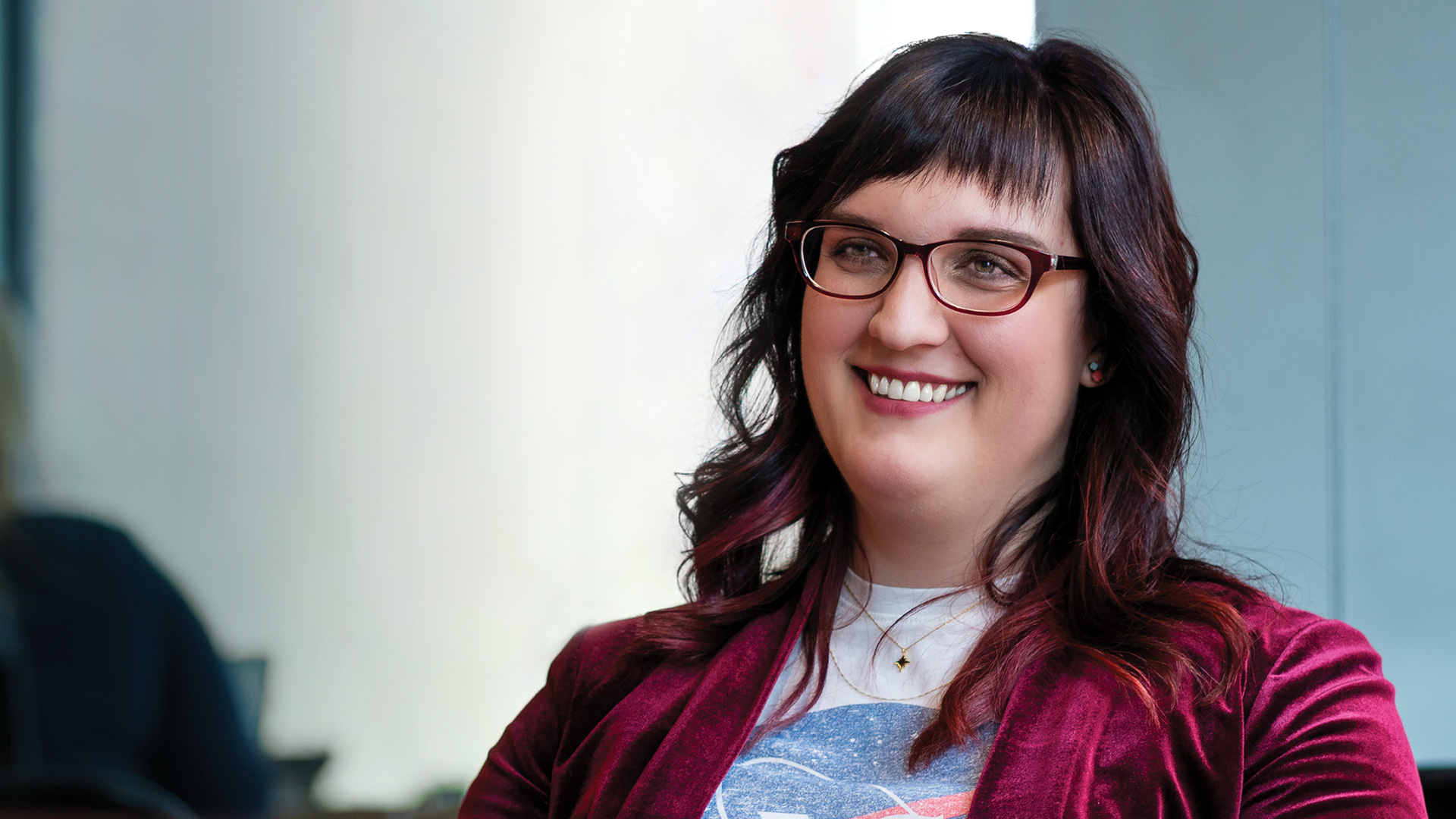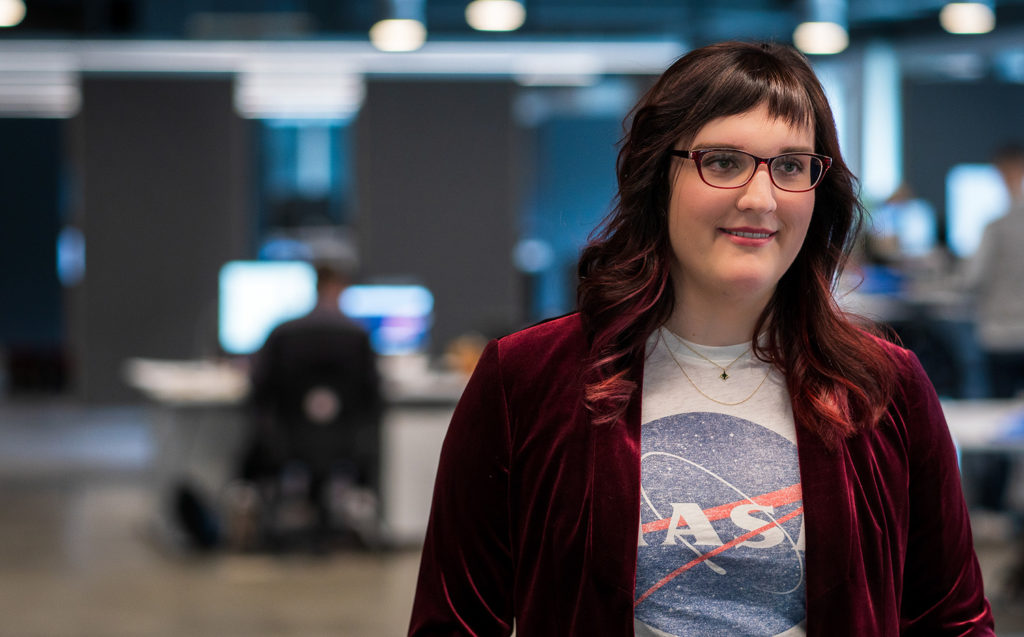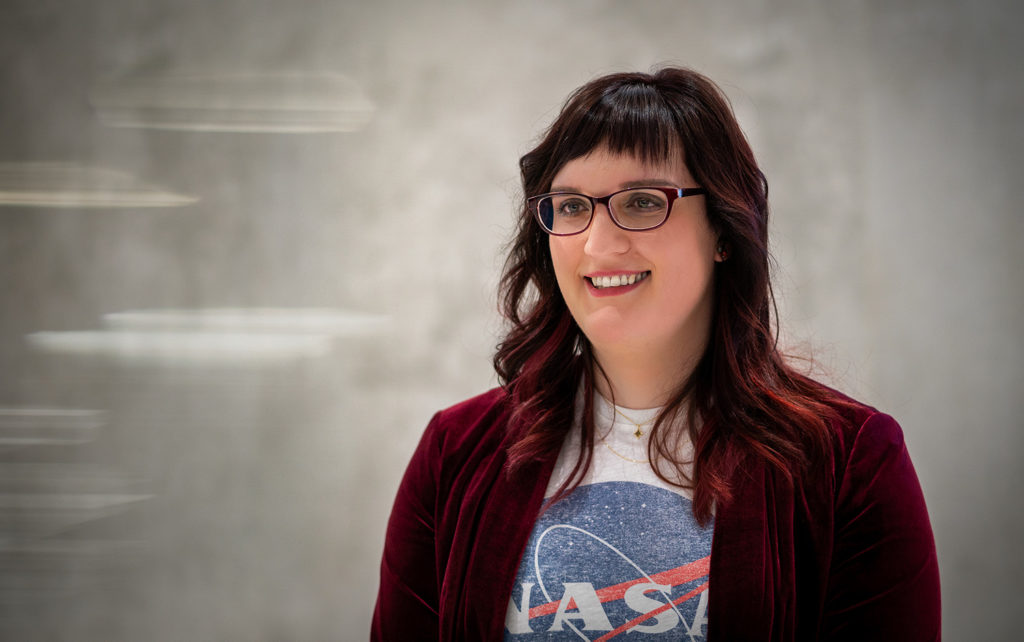
Shea Daniels
Shea Daniels is a lead software engineer at Dwolla, where she manages a team of front end developers, helps with planning and hiring, and still finds time to code. As the first openly trans employee at the company, she’s helped raise awareness about gender nonconformity in the workplace and collaborated with leadership to develop policies and resources that foster diverse, inclusive teams. Her advocacy work with Dwolla, One Iowa, and the Greater Des Moines Partnership supports those in the LGBTQ community as they navigate some of the professional challenges they may face in the workplace.
Tell us about your educational background.
I was a National Merit Scholar, went to Iowa State University and have a degree in computer science. I spent three years in ROTC there, but didn’t end up pursuing that, and went into the workforce.
What got you interested in tech?
I think it’s always been a part of my personality. My mom remembers me pointing out cars and saying, “That’s a Chevy; that’s a Ford.” My dad is a computer programmer, and he helped me do some basic programming when I was in sixth grade. Then I figured out that I could make the computer do things myself, and that opened up this huge world of possibilities. I thought, there’s this computer sitting there that’s really expensive, and other people make it do things, but now that power is with me. I can make it do whatever I want, and that’s cool. That got me hooked.
What do you do as a lead software engineer at Dwolla?
I am the leader and people manager of Dwolla’s Marketing Engineering team. My team consists of mostly front end developers whose job is to complete any engineering work that it takes to support the marketing team’s goals. This includes building and maintaining assets like dwolla.com and monetery.com, as well as a few other things. We focus on making beautiful, usable, secure performance interfaces. As a team lead, I support our team administratively with planning and hiring as well as spending time coding. Since I’m a full-stack engineer, I end up doing quite a bit of back end and DevOps work as well.
For the last five years or so, before I accepted my current role, I was an engineer on the Growth team, which works on all of the customer-facing parts of Dwolla’s platform, including ACH transfers, identity verification and registration flows, bank account verification, the API, and the customer dashboard. Occasionally, I still get to help those folks out, which is always fun. Dwolla is made up of a really amazing group of smart, talented, and kind folks. I’m always learning something new, and I’m very happy I get to work there every day!
The thing that makes us excited about Dwolla is that it’s not about us as a company; it’s about the next crazy idea that impacts people’s lives in a positive way. What we are doing is enabling folks to move money to make their app work, to make their dream work.
FinTech is a rapidly changing industry. What kind of themes or trends are you most excited about right now?
The thing that makes us excited about Dwolla is that it’s not about us as a company; it’s about the next crazy idea that impacts people’s lives in a positive way. What we are doing is enabling folks to move money to make their app work, to make their dream work. Whether that’s a savings app or a marketplace for a healthcare professional, whatever arena that is, we are powering that.
You transitioned while working at Dwolla. How did you approach this with your employer, and how did they support you?
It was something that I dealt with for several years before I said anything. I never know how to make these big decisions, to go from here to the ending. So I always take these little steps, and that’s actually the same way we build software. I don’t know what it feels like to be a man. I don’t know what it feels like to be a woman. I just know what makes me happy. I took a small step and found that what makes me happy ended up being going to a therapist to figure it out and then going to a doctor and working with that doctor.
I didn’t say anything for a year and a half because people who are trans, even with a company as cool and progressive as Dwolla, are at risk of losing their job, being ostracized, losing their medical care, losing their entire family, and that’s not a good situation. People who are otherwise underrepresented are even more at risk. I have a pretty privileged life, and I acknowledge that. But what made me OK with coming out here is there’s been a large focus in the tech space on diversity and inclusion. And what Dwolla said was, ”We think we’re pretty good, but we can’t just stand by here. We are going to actively work on doing better.”
They started a program to focus on women at Dwolla as a first step. And through those D&I [diversity and inclusion] efforts, they proved that they were being intentional about the steps they were going to take. I was always a huge supporter of those, our company culture meetings, and other things we had, and I started to feel like I wasn’t being authentic. I was supporting other folks to be themselves, and I was doing that when all indications were that I was going to be fine here.
When Ben Milne [founder and CEO of Dwolla] came and talked to our engineering group, I knew I needed to say something about who I am. The next morning I approached him by an elevator, and he canceled the rest of his hour and took a walk with me around the block and we talked about it.
I was the first person to be openly trans or come out in the office. It was kind of a “choose your own adventure” thing, which is a great metaphor for anyone’s transition, because everyone is different and every company is different. Ben asked if he could share that with the company leadership, and I said yes. Then it came down to the other folks that we thought needed to know to make a plan. The director of HR, my manager, and a few others came to me and said, “What do you want to do? We support you however you want to work this.”
I had to think, because I had gone by the seat of my pants and didn’t have a plan. I decided that if I’d told people, there must have been a reason. So I decided to come out at work and we made a plan to make that happen. We talked about what company health insurance covers and what we needed to change legally. (I’m lucky that I didn’t have to change my name. A lot of people have to do that.) We had to decide which bathroom I was going to use, and how the company leadership would make clear expectations to the other employees.
I wrote a pretty long coming out email, and Ben agreed to write an introduction and a sort of endcap with expectations. That went out on a Thursday night. I think the first text message I got was maybe three minutes after the email. I heard stories of people calling coworkers and telling them to pull over and read the email. I guess I scared a lot of people, because usually an email with your name on it from the boss means someone is quitting. People were like, “Oh, you’re just transitioning and not quitting — sweet!”
I started getting messages of support, and some of the folks here went out to dinner with me that night. I remember my hands just shaking, because even if you think people are going to support you, you just don’t know. You’re taking a big step, and once you put that out in the world, you can’t pull it all back. I cried. The days that I got those messages and came back in as myself, I’ll never forget. I decided not to change anything on Friday to just give people a chance to come in and talk to me without anything being that different. And then on Monday, I came in as myself.
Every week, we have an all-company meeting where we talk about what’s new, and successes and challenges. The head of HR stood up and introduced me as you see here. That was an emotional moment.
I think it’s very hard for other people to understand being trans. You just know your own experience, and it’s pretty mind-blowing to think you could be wrong, that things could be wrong. So I wanted to do my best to answer people’s questions. I hosted something I called “Cookies & Questions”, where people submitted questions online and I put those together and talked for a while, and then opened it up for more questions. Most of the company came, which was awesome. Then it was back to business. Everyone was like, ”Cool. We support you, we love you, you’re awesome. What about that ticket?”
In terms of working with their employer, what advice do you have for other individuals who are in the process of transitioning?
Every trans person is different, and every company is different. One of the reasons we’re trying to push other initiatives in the community is to make sure that other companies are a safe space. The first thing a trans person has to do is feel out if they’re going to be OK there. Is it actually safe to come out? For a lot of folks it isn’t. That’s a very unfortunate thing. There are still folks in Des Moines who think that I should get beat up for trying to use a bathroom.
Second, you have to know why you are coming out. What do you want to change from this, and how are you asking your company to support you? Do you want to change your pronouns to “they”? Do you want to go by a new name? Those sorts of questions. I would be hesitant to let a company drive that path; it should be based on what you want, and they should be asking how they can support you.

Every trans person is different, and every company is different. One of the reasons we’re trying to push other initiatives in the community is to make sure that other companies are a safe space.
The focus for the 2019 Catalyst Series is telling stories through the lens of tech leaders from underrepresented groups. From your perspective, why are diversity and inclusion important for Iowa’s tech community?
The first and overriding thing is that it’s the right thing to do. We are all people here. We all have hopes and dreams and emotions. We all deserve to have a community where we can be recognized for our talents.
The second thing is that, over and over, studies have shown that diverse, inclusive teams actually perform better. If people are all in the same box, then they tend to think alike and they aren’t open to new ideas. Everyone here is very smart, but each one of us has blind spots, things where other people can help fill in the gap, and that’s the whole point of teamwork. When you have these diverse points of view, you end up with better performance. This is something for companies to take advantage of, and it’s silly not to.
Dwolla is trying to be as intentional as possible. We started with our women at Dwolla initiative and then, based on feedback, we decided that we wanted to support parents as best we could — biological or adoptive. So we increased our paternal and maternal leave to 12 weeks.. That’s in addition to the unlimited PTO. So it’s explicit support from the company that says, “You can take the time you need, and we fully support you.”
We also started a diversity and inclusion committee that’s not driven from the top, and it works much better when the whole company is on board. At one point, we had a third of the company involved. We were able to start by taking action instead of just explaining the value of it, which is where a lot of people have to start, I think.
Right now, I’m working with our D&I committee to lead a public initiative where we are taking my experience in coming out and laying out how the company supports the gender expression of all employees. We recognize that we aren’t subject matter experts in that space. I’m one case study. So we reached out through our venture network and asked if there’s anyone who wants to work on this with us and create their own policies.
We want to create awareness both in the startup community and in the Midwest that this is something you should be doing because it’s the right thing to do and it will make your company better. Awareness is good, but it’s not very helpful if people don’t know where to start. Even in a company as progressive as Dwolla, we are doing a lot of Google searching and looking at other systems.
We are going to work with others to create some resources. I don’t know the final format, but our hope is to end up with a community workshop where we can bring people in from other companies, and some subject matter experts, and say, “Let’s help you with that starting point, so you can take that back to your company and make it explicit.”
We all have hopes and dreams and emotions. We all deserve to have a community where we can be recognized for our talents.
Can you share some insights from your experience with One Iowa?
I spoke at the Greater Des Moines Partnership Inclusion Forum through One Iowa. There’s also an LGBTQ Leadership Institute that they run that I’ve helped plan, and a couple other speaking panels.
One of the barriers to coming out, for me, was I felt alone. At One Iowa, I found a community where I could be myself. I’ve found amazing people there. I have a lot of privilege in my transition, and I don’t want to take that for granted. My job is to pay that forward and make it so other people can enjoy some of those benefits. That’s why One Iowa is so important to me. After focusing on marriage equality, they’ve shifted focus to a couple of different areas. One of those is transgender rights. That’s a way that I feel like I can be the most effective to facilitate change.
How can Iowa’s tech community better serve or include the LGBTQ community?
It’s about making your support explicit for all underrepresented groups and making it an inclusive community as a whole. If you just focus on LGBTQ rights, you are ignoring people of color, working moms, and other groups like that. It’s about taking the time to make that support explicit and intentional.
When you’re a five-person startup, it’s probably not the first thing on your mind. But it doesn’t cost you that much to think about what you would do in that situation, and to make sure your company is supporting that and starting to measure gender balance. Once a small company becomes medium-sized, there’s an assumption that if they haven’t needed this [diversity and balance] so far, they’re going to be OK. But they won’t.
You grow your company by intentionally thinking about your culture. Consider interviewing more people before making a hiring decision. Think, at every step, in the same way as you would about your product. Be intentional. You should be looking for people who are culture additions, who are going to bring new ideas and different skills to the company.

What are you passionate about outside of your day job?
My volunteer and advocacy work. Other than that, computer science. Computers started as a hobby, and they still kind of are. I’m also a foodie, so I’m always checking out the new restaurants in Des Moines and trying new recipes. I’m also into cocktails.
What advice do you have for someone wanting to pursue a career in technology?
The internet has many faces, but almost anything you want to learn is out there. Start making something. Find a community that is supportive. I know I’m personally willing to be a mentor, and there are other folks who are too. Just find something that you want to make that gets you excited. Unfortunately, it’s still a male-dominated career. We are going to try to change that. Don’t let folks tell you no.
What kind of impact do you want to have on the Iowa tech industry?
I want to leave an impact that I made beautiful things that helped people achieve their dreams, and I want to leave an impact of a welcoming and inclusive community.

